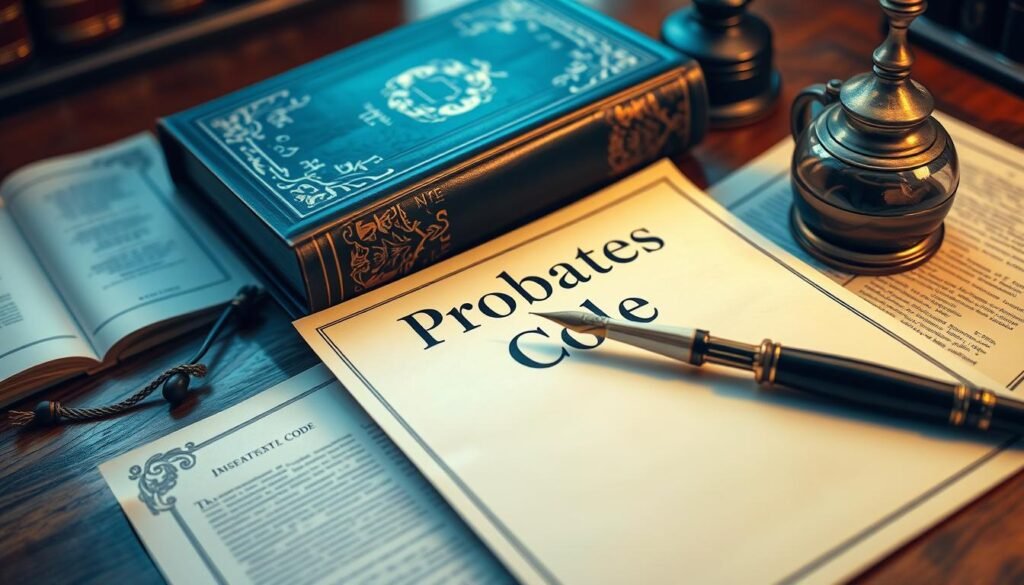Handling probate in South Carolina gets tricky when there are international assets involved. At Heritance Law, our skilled attorneys help clients through the complex legal world of cross-border inheritance and estate management.
The South Carolina Probate Code, updated by Acts No. 539, 171, and 100, sets the stage for managing estates with assets from abroad. Sections 62-3-101 and 62-3-102 explain how to transfer assets through a will. Section 62-3-105 lets parties ask for formal proceedings if needed.
Probate courts are key in managing estates. They check the assets and make sure property is distributed fairly. It’s important to file on time, as Section 62-3-108 says you have ten years after someone dies to start probate, with some exceptions.
Key Takeaways
- Understanding the South Carolina Probate Code is essential for managing estates with international assets.
- Probate courts oversee the entire estate administration process, from asset inventory to property distribution.
- Strict time limitations, such as the ten-year limit in Section 62-3-108, must be observed to ensure the timely completion of probate proceedings.
- Heritance Law’s team of specialists can navigate the complex legal requirements and minimize potential pitfalls in cross-border inheritance cases.
- Proactive planning and attention to detail are crucial when managing an estate with international assets.
Understanding SC Probate Basics and Legal Framework
In South Carolina, knowing the SC Probate Code is key when settling an estate. This set of laws covers how estates are managed. It includes rules for asset distribution, will validity, and who can oversee the process.
Key Components of South Carolina Probate Code
The SC Probate Code outlines the steps needed to manage an estate. It includes:
- How to validate and execute a will
- How to choose a personal representative or executor
- Rules for collecting and distributing assets
- How to handle creditor claims and debts
Role of Probate Courts in Estate Administration
Probate courts in South Carolina are crucial in estate management. They handle all estate-related matters, including:
- Probating wills and appointing personal representatives
- Ensuring assets are collected and distributed correctly
- Resolving disputes or challenges during the process
Time Limitations and Filing Requirements
The SC Probate Code sets time limits and filing needs for estate settlement. Important points include:
- A ten-year limit to start probate after death
- Submitting the will, asset inventory, and legal documents to court
- Meeting filing deadlines for efficient estate administration
Understanding the SC Probate Code and probate courts helps estate administrators. They can then manage the estate settlement process effectively and follow all laws.

How to Manage Probate in SC for an Estate with International Assets
Managing probate for estates with international assets is complex. It requires understanding both South Carolina (SC) and foreign laws. As more U.S. citizens live abroad, expert guidance in cross-border probate is key. At Heritance Law, we handle international estate management with care, ensuring assets are distributed correctly.
The first step is to list all foreign properties and investments. This includes bank accounts, real estate, and life insurance policies. Knowing the laws in each place is vital, as inheritance rules differ greatly.
After identifying assets, our team at Heritance Law helps get the legal authority needed. This might mean getting a probate grant or working with local lawyers. We make sure everything follows the law.
Handling cross-border probate is tough, but our experts make it easier. We work with clients and their lawyers to manage global inheritance smoothly. This ensures the deceased’s assets are handled properly.

At Heritance Law, we tackle the challenges of probate for international estates head-on. Our legal team offers personalized support. We make sure your loved one’s wishes are respected and their estate is handled according to law.
Estate Administrator Responsibilities and Powers
As an estate administrator, you have a big role. You get Letters Testamentary from the court. This gives you the power to manage the estate well. You must collect and protect all assets, both in the U.S. and abroad.
Legal Authority and Letters Testamentary
The Letters Testamentary prove you have the right to handle the estate. They let you access accounts, transfer ownership, and make big decisions about the assets.
Asset Collection and Management
One of your main jobs is to make a detailed asset inventory. This includes everything the deceased owned, even if it’s overseas. This list helps you gather, protect, and manage the assets until they can be given to the right people.
Creditor Claims and Debt Settlement
You also have to deal with creditor claims and pay off debts. This means telling creditors about claims, checking them, and paying them first. This makes sure the estate’s debts are paid before the assets are given out.
| Responsibility | Key Details |
|---|---|
| Legal Authority | Letters Testamentary grant you the legal power to act on behalf of the estate. |
| Asset Inventory | Comprehensive listing of all domestic and international assets belonging to the deceased. |
| Creditor Claims | Verifying and prioritizing payments to settle all outstanding debts owed by the estate. |
Tax Implications and Financial Considerations
Managing an estate with international assets is complex. We must file income tax returns for the deceased and the estate in multiple countries. Estate tax returns are needed for large estates. It’s important to understand international tax treaties, foreign asset valuation, and currency exchange.
Estate taxes can have a big impact. The size of the estate and the countries involved determine the taxes. Planning carefully is key to reduce taxes and follow the law.
Valuing foreign assets is a big challenge. We must accurately assess their value, considering currency exchange rates and local markets. Wrong valuations can lead to penalties and tax issues.
Currency exchange adds more complexity. We must convert assets fairly and document all transactions. This ensures the estate gets a fair value.
Handling these issues requires experts in international tax treaties, foreign asset valuation, and currency exchange. Estate planning attorneys and tax specialists can help manage the estate properly. They ensure all legal and financial duties are met.
| Tax Implication | Consideration |
|---|---|
| Estate Taxes | Understanding international tax treaties and regulations to minimize tax burden |
| Foreign Asset Valuation | Accurately assessing the value of international assets, considering currency exchange rates and local market conditions |
| Currency Exchange | Navigating the complexities of converting assets from one currency to another, ensuring fair value and proper documentation |
Conclusion
Managing probate for estates with international assets in South Carolina needs a deep understanding of laws. At Heritance Law, we guide you through the probate process. We make sure you follow SC probate rules and handle the special needs of international estate planning.
Our team of legal experts helps make the probate process smoother. They protect the interests of beneficiaries worldwide. This way, we ensure everything goes smoothly.
Proper planning and professional help are key for estates with international assets. We help clients understand South Carolina’s probate laws. We also help collect and distribute assets efficiently.
Our team knows both domestic and international laws well. This helps clients deal with the challenges of estates with global assets.
Heritance Law is here to help you, whether you’re an executor, administrator, or beneficiary. We aim to provide top-notch legal advice and personal service. This way, your estate is handled with care and professionalism, no matter where its assets are.

